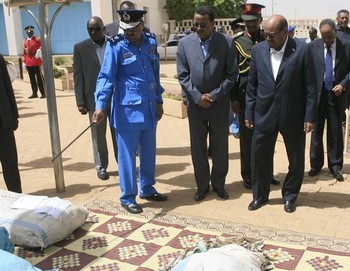Sudan, South Sudan and CAR to sign agreement to combat illicit drugs: minister
November 7, 2017 (KHARTOUM) – The Sudanese government has disclosed ongoing arrangements to sign an agreement with South Sudan and the Central African Republic (CAR) to combat illicit drug gangs.

Speaking before a police force tasked with combating illicit drug gangs Tuesday, Sudan’s Minister of Interior Hamid Mannan said the agreement with the two neighbouring nations aims to combat illicit drug cultivation and trafficking on the joint borders.
According to the pro-government Ashorooq TV, Mannan called for adopting new methods to combat illicit drugs in Sudan, vowing to provide full support for the General Directorate of Narcotics Control to carry out its tasks.
He described the illicit drug trade as “organized crime”, calling to develop the required plans and provide the necessary financial support to confront it.
In 2013, Colonel Salah Sinada of the Anti-Narcotics Department at the Sudanese Ministry of Interior revealed that the percentage of the users of Cannabis or Bango as known locally has risen to 34% as extrapolated to the country’s adult population.
Cannabis production and consumption is strictly illegal in Sudan. The country’s struggle with the drug was highlighted in the United Nations’ (UN) 2011 World Drug Report which ranks Sudan as number 12 worldwide in terms of seized amounts of cannabis, with 17,255 kg seized in 2009.
Al-Radom area which lies on the borders of South Darfur State with the CAR is considered the leading production area for cannabis in Sudan.
In June 2013, president Omer Hassan al-Bashir issued a directive to form a supreme council for drug control under his chairmanship with the aim of arriving at a drug-free Sudan.
He expressed commitment to provide the necessary budget to meet the needs of the council, saying his government is ready to combat what he described as the “deadly disease” which weakens the youth, wastes time and threatens nations.
Last year, Sudan opened two advanced stations to combat commodity and illicit drugs smuggling along the border with South Sudan.
(ST)
